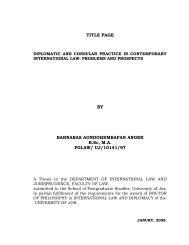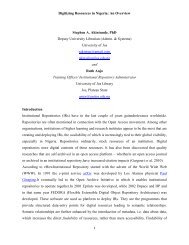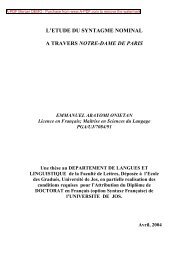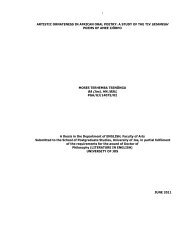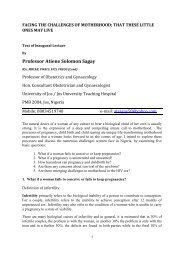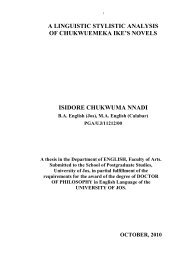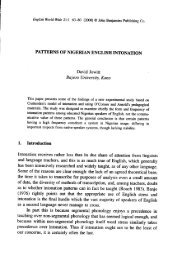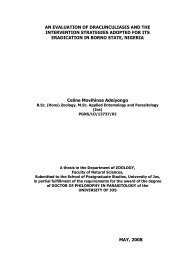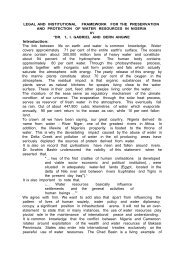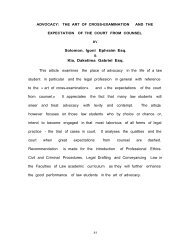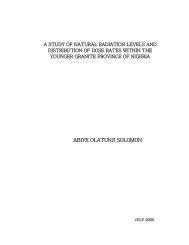Nigerian drama political agitation in tor iorapuu.pdf - University of ...
Nigerian drama political agitation in tor iorapuu.pdf - University of ...
Nigerian drama political agitation in tor iorapuu.pdf - University of ...
Create successful ePaper yourself
Turn your PDF publications into a flip-book with our unique Google optimized e-Paper software.
NIGERIAN DRAMA POLITICAL AGITATION IN TOR IORAPUU'S<br />
APRIL 1421<br />
Abstract<br />
Reuben Embu Ph.D<br />
Theatre and Film Arts Department, <strong>University</strong> <strong>of</strong> Jos<br />
The <strong>Nigerian</strong> <strong>political</strong> scene witnessed<br />
a new lease <strong>of</strong> life <strong>in</strong> 1999 when<br />
democratic elections were held putt<strong>in</strong>g<br />
a hold on military dicta<strong>tor</strong>ship which<br />
hitherto characterized the body polity.<br />
The' past eight years <strong>of</strong><br />
experimentation and practice <strong>of</strong><br />
democracy <strong>in</strong> Nigeria cannot truly be<br />
said to be truly democratic <strong>in</strong> the real<br />
sense <strong>of</strong> the word judg<strong>in</strong>g from the<br />
<strong>political</strong> escapades <strong>of</strong> the ac<strong>tor</strong>s. The<br />
erstwhile president, Gen. Olusegun<br />
Aremu Obasanjo who was a retired<br />
military man saw the <strong>political</strong> terra<strong>in</strong> as<br />
a cont<strong>in</strong>uation <strong>of</strong> the military regime he<br />
once headed. The govemors,<br />
m<strong>in</strong>isters, members <strong>of</strong> senate and<br />
houses <strong>of</strong> assembly displayed a high<br />
level <strong>of</strong> <strong>in</strong>eptitude which was further<br />
compounded by corruption. The<br />
<strong>drama</strong>tist, Tor lorapuu who is also a<br />
member <strong>of</strong> the society encapsulates<br />
the <strong>political</strong> developments <strong>in</strong> this play<br />
April 1421 to depict the ugly situation<br />
<strong>in</strong> the country. The play under<br />
exam<strong>in</strong>ation reflects upon the 2007<br />
elections, how manipulations and<br />
rigg<strong>in</strong>gs were carried out depriv<strong>in</strong>g the<br />
people <strong>of</strong> their adult franchise. The<br />
play is quite reveal<strong>in</strong>g as it succ<strong>in</strong>ctly<br />
captures the corruption and excesses<br />
<strong>of</strong> not only the <strong>political</strong> class, but the<br />
traditional <strong>in</strong>stitution as well and their<br />
role <strong>in</strong> politics.<br />
Introduction<br />
The response to <strong>political</strong> politick<strong>in</strong>g <strong>in</strong><br />
Nigeria by playwrights is not new. Over the<br />
years, icons like Soy<strong>in</strong>ka, Ola Rotimi, Femi<br />
Os<strong>of</strong>isan, Bode Sowande, Iyorwuese Hagher,<br />
Rasaki Bakare, Vic<strong>tor</strong> Dugga, Dauda Musa,<br />
etc have <strong>in</strong> one way or the other commented<br />
on the <strong>Nigerian</strong> State <strong>in</strong> their creative works.<br />
These works capture certa<strong>in</strong> issues with<strong>in</strong> the<br />
epoch they were written.<br />
The text under study April1421 by Tor<br />
lorapuu is based on the recently conducted<br />
elections <strong>in</strong> Nigeria by the Obasanjo<br />
adm<strong>in</strong>istration. The title <strong>of</strong> the play specifically<br />
refers to the governorship and State Houses<br />
<strong>of</strong> Assembly elections held on the 14th April<br />
2007 and the Presidential, Senate and House<br />
<strong>of</strong> Representatives held on the 21 <strong>of</strong> the same<br />
month. The paper will therefore address some<br />
<strong>of</strong> the issues raised <strong>in</strong> the play with a view <strong>of</strong><br />
ensur<strong>in</strong>g Nigeria plays politics accord<strong>in</strong>g to the<br />
rules. Tor lorapuu is a lecturer with the<br />
Theatre and Communication Arts Department,<br />
<strong>University</strong> <strong>of</strong> Jos and hails from Benue State,<br />
Nigeria. lorapuu's area <strong>of</strong> <strong>in</strong>terest is mostly<br />
Theartre for Development but he also delves<br />
<strong>in</strong>to play writ<strong>in</strong>g. His first play titled Had I<br />
Known, is a by-product <strong>of</strong> a theatre for<br />
development project sponsored by Mac-Arthur<br />
Foundation, while April 1421 is the second.<br />
Lame Bamidele's work on Wait<strong>in</strong>g for<br />
Lefty discusses mutatis mutandis what April<br />
1421 also addresses. The play is classified<br />
under the popular protest form <strong>of</strong> <strong>drama</strong> s<strong>in</strong>ce<br />
it concerns itself with the welfare <strong>of</strong> the<br />
masses <strong>in</strong> Nigeria and the <strong>in</strong>justices that are<br />
perpetrated by the pseudo-bourgeoisies.<br />
Bamidele (2000:122) notes that
social reform. Liberty, rebellion, social <strong>in</strong>justice<br />
and... recommends itself to workers union as<br />
a play that could energize them <strong>in</strong> their<br />
strategy for socio-economic change because it<br />
relies on the Agit-prop mode <strong>of</strong> performance.<br />
Theoretical Framework: The Concept <strong>of</strong><br />
Agit-Prop<br />
The concept <strong>of</strong> propaganda and<br />
<strong>agitation</strong> accord<strong>in</strong>g to A.P Foulkes (1983:19)<br />
"is usually subversive and oppositional. It may<br />
seek to overthrow a government or<br />
established order ... it can be understood as a<br />
call for action". Similarly, Bamidele's<br />
exposition on agit-prop, traced the concept <strong>of</strong><br />
<strong>agitation</strong> and propaganda to the Soviet Union<br />
about the 1920s. Accord<strong>in</strong>g to him, it serves a<br />
didactic purpose by emphasiz<strong>in</strong>g a social<br />
class theme and appeal<strong>in</strong>g to social activism<br />
among its proletarian audiences. It also<br />
consists <strong>of</strong> <strong>political</strong> satires <strong>in</strong> which the<br />
capitalist who is ~ell dressed <strong>in</strong> big gown is<br />
<strong>in</strong>variably the villa<strong>in</strong> and the worker <strong>in</strong> overall<br />
or work suit, the sh<strong>in</strong><strong>in</strong>g hero. He stressed that<br />
some <strong>of</strong> the earliest agit-props were realistic<br />
but crude. They were a blend <strong>of</strong> chanted<br />
dialogue and mass movement <strong>in</strong> which ac<strong>tor</strong>s,<br />
perform<strong>in</strong>g <strong>in</strong> unison, symbolized the work<strong>in</strong>g<br />
class solidarity necessary for the overthrow <strong>of</strong><br />
the capitalist system.<br />
Foulkes (1983:2) exposition on<br />
propaganda as it relates to literature and<br />
society fits <strong>in</strong>to the theoretical framework <strong>of</strong><br />
this paper.<br />
The relationship between literature and art to<br />
propaganda is not straight forward, and would<br />
<strong>in</strong> any case be dismissed as <strong>in</strong>significant by<br />
many critics whose evaluative criteria would<br />
lead them to make a dist<strong>in</strong>ction between 'real<br />
literature' and 'tendentious' writ<strong>in</strong>g.<br />
Based on this we would tend to agree to some<br />
extent with George Orwell that "all art is to<br />
,some extent propaganda" (Foulkes 1983:2). In<br />
agit-prop, a lot <strong>of</strong> <strong>drama</strong>tic and aesthetic<br />
Education and Development <strong>in</strong> Africa: Interfaces, Issues and Perspectives<br />
devices are employed: choral rendition,<br />
episodic structure, satiric caricature, pseudonames<br />
and theatrical stylization (Bamidele<br />
2000:123). The play April 1421 is not an<br />
exception. The public presentation <strong>of</strong> the play<br />
<strong>in</strong> 2007 at the Open Air Theatre (OAT)<br />
<strong>University</strong> <strong>of</strong> Jos <strong>in</strong>corporated all these<br />
<strong>drama</strong>tic devices.<br />
The play April 1421 is set <strong>in</strong> a<br />
construction site with the foreman as the boss<br />
and other workers work<strong>in</strong>g under him. The<br />
play gives an <strong>in</strong>sight <strong>in</strong>to the 2007 elections<br />
where Mrs. Akpambo and Mama Friday lost<br />
their loved ones <strong>in</strong> the process and their<br />
resilience to keep fight<strong>in</strong>g on, until the <strong>in</strong>justice<br />
and the wrong values <strong>of</strong> democracy were<br />
achieved. The scenario <strong>of</strong> the military be<strong>in</strong>g<br />
driven away by the civil society is depicted to<br />
show how the former are no longer· needed<br />
and the usher<strong>in</strong>g <strong>in</strong> <strong>of</strong> democracy. The<br />
Honourable Sena<strong>tor</strong> and former foreman lost<br />
his bid for a re-election for not keep<strong>in</strong>g his<br />
campaign promises. The narra<strong>tor</strong> craftily<br />
weaves the episodes together, carry<strong>in</strong>g<br />
everyone along especially the construction<br />
workers <strong>in</strong>to one united people ready to fight<br />
for their rights.<br />
April 1421 and Socio- Political Realities <strong>in</strong><br />
Nigeria<br />
The construction site is a metaphor <strong>of</strong> the<br />
<strong>Nigerian</strong> <strong>political</strong> scene where all sorts <strong>of</strong><br />
<strong>political</strong> manipulations take place. The<br />
foreman represents the status quo or<br />
oppressed system and that is why the workers<br />
at the construction site impeached him and<br />
nom<strong>in</strong>ated the youth leader as their new<br />
foreman. The <strong>political</strong> scenario then was<br />
replete with impeachments and impeachment<br />
threats <strong>in</strong> most houses <strong>of</strong> assembly and even<br />
the presidency. In Plateau and Benue States,<br />
the speakers where impeached due to <strong>political</strong><br />
wrangli,ngs and manoeuvr<strong>in</strong>gs.<br />
In writ<strong>in</strong>g this play, the playwright
seems to be angry with the way <strong>political</strong><br />
happen<strong>in</strong>gs were tak<strong>in</strong>g place <strong>in</strong> the country.<br />
The language used is also very dense and<br />
critical and <strong>in</strong> some <strong>in</strong>stances subversive.<br />
Adopt<strong>in</strong>g the Marxian aesthetics us<strong>in</strong>g songs,<br />
s<strong>tor</strong>y tell<strong>in</strong>g, images <strong>of</strong> colours, and so on, the<br />
play stands as a true mediation <strong>of</strong> the <strong>Nigerian</strong><br />
polity, reflect<strong>in</strong>g the socio-<strong>political</strong> realities <strong>of</strong><br />
our immediate past and current trend <strong>of</strong><br />
events. The playwright's religious <strong>in</strong>cl<strong>in</strong>ation<br />
and experience as an activist <strong>in</strong> the NGO<br />
world as well as a teacher <strong>in</strong>fluenced him a<br />
great deal <strong>in</strong> writ<strong>in</strong>g this play.<br />
At the construction site is a poor<br />
woman called Mama 'Friday, who comes to<br />
sell kunu (local gruel) to the workers. Her<br />
<strong>in</strong>volvement with the foreman and the<br />
experience <strong>of</strong> the family imp<strong>in</strong>ges on activities<br />
at the site. She accuses the foreman <strong>of</strong> sexual<br />
harassment at the construction site: "... AII you<br />
want is sex" (Iorapuu 2007:31) and is<br />
aggrieved with the system because <strong>of</strong> the way<br />
and manner she lost her pr<strong>in</strong>cipled husband<br />
and two sons. Her description <strong>of</strong> the system<br />
speaks for itself: "...Thou shall not oppose or<br />
you are oppressed; thou shall riot question or<br />
you are quarant<strong>in</strong>ed like a virus; and thou<br />
shall not expose or you are elim<strong>in</strong>ated"<br />
(Iorapuu 2007:32). This statement is loaded<br />
and com<strong>in</strong>g from a supposedly illiterate<br />
woman, it speaks about the <strong>in</strong>justice prevalent<br />
<strong>in</strong> the land as the economy is also plundered.<br />
Her reference to the foreman's demand for<br />
sex can metaphorically be <strong>in</strong>terpreted to mean<br />
the <strong>Nigerian</strong> economy which the <strong>political</strong> class<br />
embezzle without mean<strong>in</strong>gful development <strong>of</strong><br />
the people.<br />
Apart from <strong>agitation</strong>, lorapuu uses the<br />
play to conscientize the masses on their<br />
<strong>political</strong> and social rights. The presentation <strong>of</strong><br />
vibrant characters like Mrs. Akpambo, Madam<br />
Fire, Mama Friday, Hembeto, Youth leader,<br />
the colours, etc, all go to liven up the<br />
dampened spirit <strong>of</strong> the people. Mrs'. Akpambo<br />
and Madam Fire, for <strong>in</strong>stance encourage the<br />
workers on work<strong>in</strong>g ethics and the need for<br />
them to wake up:<br />
Mrs Akpambo: .. There is no easy road to<br />
freedom. We want work for all; we want justice<br />
for all; let the m<strong>in</strong>d, soul, and body be<br />
fulfilled ... let the awareness <strong>of</strong> our diversities<br />
be our unit<strong>in</strong>g force.<br />
Madam Fire: ... It is about liberation, it is about<br />
emancipat<strong>in</strong>g ourselves from our brothers;<br />
from the brutaliz<strong>in</strong>g manner your construction<br />
site is run (Iorapuu 2007:10).<br />
The outburst arises due to the <strong>political</strong><br />
situation <strong>in</strong> the country where the right values<br />
are be<strong>in</strong>g jettisoned and <strong>in</strong>justice perpetrated.<br />
Politics and Democracy<br />
The term "Democracy" is capable <strong>of</strong><br />
hav<strong>in</strong>g many def<strong>in</strong>itions and connotations to<br />
different schools <strong>of</strong> thoughts. However, we<br />
would adopt the one by Obasanjo and<br />
Mabogunje (1992:1), which is explicit enough<br />
for this discourse.<br />
The concept <strong>of</strong> democracy should be<br />
exam<strong>in</strong>ed from two po<strong>in</strong>ts <strong>of</strong> view, that is,<br />
ideology and as politics. Democracy, as<br />
ideology, is the philosophy <strong>of</strong> governance<br />
which sets a high premium on the basic<br />
freedom or fundamental human rights <strong>of</strong> the<br />
citizens, the rule <strong>of</strong> law, the right to property,<br />
the flow <strong>of</strong> <strong>in</strong>formation and the right <strong>of</strong> choice<br />
between alternative <strong>political</strong> positions ...<br />
democracy as politics is concerned with the<br />
<strong>in</strong>stitutions and processes <strong>of</strong> governance.<br />
These <strong>in</strong>stitutions and the procedure <strong>of</strong><br />
governance that they elicit tend to foster<br />
consensus whilst simUltaneously promot<strong>in</strong>g<br />
and susta<strong>in</strong><strong>in</strong>g respect for the ideology <strong>of</strong><br />
democracy.<br />
Plausible as this def<strong>in</strong>ition looks, does<br />
it reflect the current democratic set up it<br />
Nigeria? Why are the issues embedded <strong>in</strong> the<br />
concept not be<strong>in</strong>g perceived or felt <strong>in</strong> the body
policy? These are rhe<strong>tor</strong>ical questions that<br />
both leaders and followers need to ponder<br />
upon. Democracy can only thrive and be<br />
entrenched <strong>in</strong> a society where the people are<br />
committed and <strong>in</strong>volved <strong>in</strong> it with a view <strong>of</strong><br />
<strong>in</strong>itiat<strong>in</strong>g and' implement<strong>in</strong>g well mean<strong>in</strong>g<br />
programmes. . Ignatius Kaigama, (2006:4)<br />
raised some fundamental questions which are<br />
vital for both the elec<strong>tor</strong>ates and those<br />
aspir<strong>in</strong>g <strong>in</strong>to <strong>political</strong> <strong>of</strong>fices not only <strong>in</strong><br />
Plateau State, but Nigeria as a whole:<br />
... What is your understand<strong>in</strong>g <strong>of</strong> politics?<br />
Analyse or evaluate the way politics is played<br />
<strong>in</strong> Nigeria and Plateau State. How can the<br />
elec<strong>tor</strong>ate contribute towards good<br />
governance? What are the qualities <strong>of</strong> a good<br />
politician? If you were elected a <strong>political</strong><br />
leader, how would you alleviate poverty? If a<br />
politician comes to ask for your vote, what<br />
specific area <strong>of</strong> development <strong>in</strong> Plateau State<br />
would you demand <strong>of</strong> him or her? What are<br />
your hopes, fears and worries for the ejection<br />
2007?<br />
The new <strong>Nigerian</strong> democracy after the<br />
military dicta<strong>tor</strong>ial era would be n<strong>in</strong>e years old<br />
<strong>in</strong> 2008 and as far as age is concerned, she is<br />
still a baby that needs nurtur<strong>in</strong>g. The practice<br />
<strong>of</strong> partisan politics <strong>in</strong> Nigeria is not only scary<br />
but horrify<strong>in</strong>g. The politicians <strong>in</strong>dulge <strong>in</strong> all<br />
sorts <strong>of</strong> means to come <strong>in</strong>to power. The use <strong>of</strong><br />
thugs and hoodlums, bombs; etc to kill and<br />
maim their opponents are very rampant.<br />
These <strong>political</strong>ly motivated kill<strong>in</strong>gs which are<br />
captured by Wole Soy<strong>in</strong>ka (2005:8) <strong>in</strong> the<br />
Intervention series and equally highlighted by<br />
Kaigama are quite disturb<strong>in</strong>g for the nascent<br />
democracy's survival.<br />
... the former At<strong>tor</strong>ney General and M<strong>in</strong>ister<br />
<strong>of</strong> Justice, Chief Bola Ige 23rd Dec. 2001,<br />
Odunayo Olagbeju, Ahmed Pategi, Barr.<br />
Bamabas Igwe and his pregnant wife Abigail,<br />
Mr. John Nuhu, Isiyaku Mohammed, Uche<br />
Ogb<strong>in</strong>anya, Dr. Harry Marshal, Chief<br />
Am<strong>in</strong>asoari Dikibo, Chief Funsho Williams,<br />
Education and Development <strong>in</strong> Africa: Interfaces, Issues and Perspectives<br />
Chief Jesse Aruku, and Dr. Ayodeji Daramola.<br />
The list <strong>of</strong> <strong>political</strong>ly motivated kill<strong>in</strong>gs is<br />
endless especially those that are not be<strong>in</strong>g<br />
reported. The late Bola Ige was assaulted at<br />
the palace <strong>of</strong> the Doni (Chief) <strong>of</strong> Ife and was<br />
eventually killed on <strong>political</strong> grounds (Soy<strong>in</strong>ka,<br />
2005:27). The Doni is supposed to serve as<br />
the custodian and father <strong>of</strong> all, yet could not<br />
protect the then m<strong>in</strong>ister, Chief Bola Ige. This<br />
shows the level <strong>of</strong> participation <strong>of</strong> traditional<br />
rulers <strong>in</strong> dirty politics <strong>in</strong> Nigeria. They hide<br />
under the cloak <strong>of</strong> the traditional <strong>in</strong>stitution to<br />
perpetuate evil. Soy<strong>in</strong>ka (2005:9) <strong>in</strong><br />
Interventions I, while comment<strong>in</strong>g on late Bola<br />
Ige's death, cautions <strong>Nigerian</strong>s thus:<br />
.... We are a nation that kills our best.<br />
Largeness <strong>of</strong> heart is regarded as a medical<br />
condition, like an enlarged heart, requir<strong>in</strong>g<br />
drastic <strong>in</strong>tervention. Tolerance is ridiculed as<br />
the mark <strong>of</strong> weakness. Even the symbols that<br />
should Iieal and b<strong>in</strong>d the nation together are<br />
tumed <strong>in</strong>to agencies <strong>of</strong> death <strong>in</strong>clud<strong>in</strong>g those<br />
<strong>of</strong> faith, piety, religion ...<br />
Soy<strong>in</strong>ka (2005:11) appeals to <strong>Nigerian</strong><br />
politicians and their compradors or<br />
accomplices to have a reth<strong>in</strong>k on their actions:<br />
Let the killers among us pause, and reflect.<br />
The route to the m<strong>in</strong>d is not the path <strong>of</strong> bullets<br />
nor the path <strong>of</strong> the blade, but the <strong>in</strong>visible, yet<br />
palpable paths <strong>of</strong> discourse <strong>of</strong> our private and<br />
social be<strong>in</strong>gs. Let the kill<strong>in</strong>g stop and the<br />
<strong>in</strong>tercourse <strong>of</strong> m<strong>in</strong>d beg<strong>in</strong>.<br />
The bottom l<strong>in</strong>e eventually is to ga<strong>in</strong><br />
<strong>political</strong> power negat<strong>in</strong>g basic human<br />
considerations, such as the issue <strong>of</strong> human<br />
dignity for every <strong>Nigerian</strong> citizen, which must<br />
not be comprised and politicians who <strong>in</strong>dulge<br />
<strong>in</strong> this vice, need to heed the call as<br />
propounded <strong>in</strong> April 1421 by Tor lorapuu, for<br />
a healthy body polity. In the play, the ordeal <strong>of</strong><br />
Mrs. Akpambo and Mama Friday were<br />
presented to drive home some lessons as<br />
seen <strong>in</strong> this dialogue:<br />
Youth Leader: How did your 'entire family die
anyway?<br />
Mama Friday: Mister, first they killed my<br />
husband. He won't allow the los<strong>in</strong>g party to rig<br />
the April 1421 election <strong>in</strong> his ward. They<br />
fol/owed and shot him right by his door. My<br />
son Friday, was also shot dead by some<br />
uniformed men. You aI/ know him. He is the<br />
young man Mrs. Akpambo spoke about<br />
(Iorapuu 2007:32).<br />
Mama Friday's experience is what most<br />
families are go<strong>in</strong>g through as she laments:<br />
"....We are wounded for democracy. My son<br />
helped them to stuff the ballot papers for the<br />
dishonourable sena<strong>tor</strong> and they awarded him<br />
a death certificate" (Iorapuu 2007:33). The<br />
<strong>political</strong> demagogues can go as far as sett<strong>in</strong>g<br />
their opponent's house ablaze or other forms<br />
<strong>of</strong> harm simply because he is likely to threaten<br />
the operat<strong>in</strong>g system. The Youth leader II<br />
brands these crop <strong>of</strong> s<strong>in</strong>ister and disreputable<br />
politicians "execu-thieves" exchang<strong>in</strong>g batons<br />
with the "legis-looters" (Iorapuu 2007:34).<br />
These pseudo names refer to the executive<br />
and legislative arms <strong>of</strong> government who<br />
perpetuate corruption.<br />
In the case <strong>of</strong> Mrs. Akpambo, three <strong>of</strong><br />
her children died as a result <strong>of</strong> mo<strong>tor</strong> accident<br />
on their way from the stream. The search for<br />
water every day is one <strong>of</strong> the many ugly<br />
circumstances <strong>Nigerian</strong>s ar~ faced with and<br />
this has been on for over four decades. The<br />
people lack social amenities so have to<br />
struggle to survive. The basic necessities <strong>of</strong><br />
life like adequate dr<strong>in</strong>k<strong>in</strong>g water, hospitals and<br />
cl<strong>in</strong>ics, good roads, etc are not provided due<br />
to corruption which is endemic <strong>in</strong> Nigeria.<br />
Speak<strong>in</strong>g about the Peoples<br />
Democratic Party, the Nigeria's rul<strong>in</strong>g party,<br />
Soy<strong>in</strong>ka (2005:22) vituperates this way:<br />
I am conv<strong>in</strong>ced, beyond any further<br />
doubt that there exists with<strong>in</strong> the rul<strong>in</strong>g party,<br />
a nest <strong>of</strong> murderers. Their purpose is power,<br />
and to atta<strong>in</strong> and reta<strong>in</strong> this at all costs is a<br />
mission that habours a deep contempt for<br />
Education and Development <strong>in</strong> Africa: Interfaces, Issues and Perspectives<br />
moral scruples ... The conduct <strong>of</strong> PDP, apart<br />
from its provable e/~c<strong>tor</strong>al crim<strong>in</strong>ality, goes<br />
beyond <strong>in</strong>decency; it is a national<br />
obscenity ... The rul<strong>in</strong>g party is ta<strong>in</strong>ted, INEe is<br />
ta<strong>in</strong>ted, the govemment is ta<strong>in</strong>ted and many<br />
<strong>in</strong>dividuals ...<br />
Soy<strong>in</strong>ka is talk<strong>in</strong>g about a cabal<br />
found <strong>in</strong> the higher reaches <strong>of</strong> government<br />
that has exercised such <strong>in</strong>fluence <strong>in</strong> policy and<br />
redef<strong>in</strong>ed governance as an exercise <strong>of</strong><br />
impunity, protect<strong>in</strong>g their underl<strong>in</strong>gs and other<br />
nefarious activities and cites the fraudulent<br />
election <strong>of</strong> Iyola Omisore, ex-deputy governor<br />
<strong>of</strong> Osun State, even while <strong>in</strong> prison as a case<br />
<strong>in</strong> po<strong>in</strong>t. Apart from be<strong>in</strong>g a prime suspect <strong>in</strong><br />
Bola Ige's murder, he never stomped a<br />
campaign trail nor mounted a soap box but<br />
was pronounced vic<strong>tor</strong>ious as sena<strong>tor</strong> <strong>in</strong> a<br />
kangaroo election by PDP.<br />
Religious and Social Implications<br />
lorapuu's play has a lot <strong>of</strong> religious<br />
undertones. The reference to div<strong>in</strong>e<br />
punishment from God on politicians' attitude<br />
and behaviour leaves much to be desired. In<br />
the play, the author made allusions to<br />
<strong>in</strong>dividuals and politicians <strong>in</strong> position who<br />
deprive the masses <strong>of</strong> what is due to them as<br />
"koro, koro, tief (broad day light thieves) and<br />
ask for punishment on them by the ances<strong>tor</strong>s.<br />
One <strong>of</strong> the songs reproduced here is to show<br />
the magnitude <strong>of</strong> the havoc be<strong>in</strong>g caused on<br />
the suffer<strong>in</strong>g masses:<br />
Dem bi koro koro tief,<br />
Wet<strong>in</strong> be your own<br />
You chop I no talk,<br />
You clean your mouth,<br />
I still no talk<br />
Then you slap me<br />
You say make I no cry<br />
Haba! Koro koro tief<br />
Wet<strong>in</strong> I do you<br />
Na you get knife<br />
Na you get yam, na you get gun
Koro koro tief your own na baba<br />
You de kampe, you dey kampe<br />
(Iorapuu 2007:12)<br />
This song is composed <strong>in</strong> the Pidg<strong>in</strong><br />
English, which is a language that is<br />
characteristic <strong>of</strong> the masses. They understand<br />
it easily for transaction and communication<br />
purposes and the play is replete with pidg<strong>in</strong><br />
laced with the Queen's English <strong>in</strong> other to<br />
reach a balance between the upper class and<br />
the masses.<br />
The playwright made allusions to the<br />
" epileptic services <strong>of</strong> the NNPC and its<br />
eventual sale to Dangonet. Any good th<strong>in</strong>k<strong>in</strong>g<br />
<strong>Nigerian</strong> need not be told who this person is <strong>in</strong><br />
Nigeria. This is one <strong>of</strong> the hordes <strong>of</strong> other<br />
government corporations sold by the then<br />
Obasanjo adm<strong>in</strong>istration as a way <strong>of</strong><br />
empower<strong>in</strong>g themselves with "nongovernment"<br />
pe~orm<strong>in</strong>g ventures before<br />
leav<strong>in</strong>g <strong>of</strong>fice. The Power Hold<strong>in</strong>g Company<br />
(PHCN) formerly National Electric Power<br />
Authority (NEPA) and Transcorp. Hilton then<br />
NICq~ NUGA Hotel are classic examples <strong>of</strong><br />
agencies sold. They were sold to politicians<br />
and their allies <strong>in</strong> the private sec<strong>tor</strong> to cont<strong>in</strong>ue<br />
to dom<strong>in</strong>ate the <strong>political</strong> scene so that even<br />
after leav<strong>in</strong>g <strong>of</strong>fice they would some how still<br />
be <strong>in</strong> power. That is the <strong>Nigerian</strong> scenario <strong>of</strong><br />
politick<strong>in</strong>g and hold<strong>in</strong>g on to power.<br />
The Place <strong>of</strong> the Youth <strong>in</strong> <strong>Nigerian</strong> Politics<br />
The concept <strong>of</strong> the youth is one that<br />
has an elastic frame; thus one is licensed to<br />
def<strong>in</strong>e it the way it suits him. There are<br />
however basic <strong>in</strong>dica<strong>tor</strong>s <strong>of</strong> what it ought to<br />
be. George Horvath (1971) views the youth as<br />
healthy and active mature <strong>in</strong>dividuals. The<br />
basic <strong>in</strong>dica<strong>tor</strong>s noted here <strong>of</strong> the youth<br />
<strong>in</strong>clude "good health, activeness and<br />
maturity". This category <strong>of</strong> yout~ falls between<br />
the ages <strong>of</strong> 18-35.<br />
Education and Development <strong>in</strong> Africa: Interfaces, Issues and Perspectives<br />
The youths <strong>in</strong> every society constitute<br />
not just the active work force but also the<br />
nerve <strong>of</strong> that society. The role <strong>of</strong> the youths <strong>in</strong><br />
economic, <strong>political</strong> and cultural growth and<br />
development <strong>in</strong> any society is someth<strong>in</strong>g that<br />
cannot be easily quantified. If the youths are<br />
removed or neglected <strong>in</strong> any society, that<br />
society is bound to collapse. Ignatius Kaigama<br />
(2006:20) cautions that<br />
... concerted efforts must be made to give the<br />
youth a qualitative and functional education<br />
with special attention to character fonnation<br />
and healthy spiritual growth. With<br />
sound education the m<strong>in</strong>d is broadened,<br />
religious views are respected and what comes<br />
upper most <strong>in</strong> the m<strong>in</strong>ds <strong>of</strong> the youth is how to<br />
contribute their quota to build a nation that<br />
utilizes its potentials to the fullest. ..<br />
They could devout their precious time to<br />
productive social programmes or ventures<br />
such as war aga<strong>in</strong>st corruption, thuggery,<br />
idleness, arm robbery, steal<strong>in</strong>g, beat<strong>in</strong>g <strong>of</strong><br />
parents, HIV/AIDS pandemic, etc <strong>in</strong>stead <strong>of</strong><br />
dr<strong>in</strong>k<strong>in</strong>g and smok<strong>in</strong>g their lives away. In this<br />
way they become social crusaders for the<br />
development <strong>of</strong> fellow youths who are still <strong>in</strong><br />
the dark and do not know what to do <strong>in</strong> life.<br />
The youths could organize themselves <strong>in</strong>to<br />
pressure or <strong>in</strong>terest groups to solicit for<br />
development programmes from the local, state<br />
and federal governments through their elected<br />
representatives <strong>in</strong>stead <strong>of</strong> be<strong>in</strong>g used for<br />
<strong>political</strong> ga<strong>in</strong>s. Our people need adequate<br />
water supply either through boreholes or water<br />
board, electricity supply, good roads and<br />
bridges, functional health facilities and so on.<br />
These are issues that should preoccupy the<br />
m<strong>in</strong>ds <strong>of</strong> the youths.<br />
The youths <strong>in</strong> Nigeria have <strong>of</strong> late<br />
contributed negatively to both community and<br />
national development especially dur<strong>in</strong>g the<br />
democratic era. It is obvious that dur<strong>in</strong>g the<br />
dicta<strong>tor</strong>ial regimes, the activities <strong>of</strong> the,youths<br />
were subdued to the barest m<strong>in</strong>imum by the
Education and Development <strong>in</strong> Africa: Interfaces, Issues and Perspectives<br />
__ iiiiiii __ iiiiiiiiiiiiiiiiiiiiiiiiiiiiiiiiiiiiiiiiiiiiiiiiiiiiiiiiiiiiiiiiiiii;iiiiiiiiiii<br />
stern position <strong>of</strong> the military. The democratic<br />
dispensation however gives room for freedom<br />
<strong>of</strong> expression; know<strong>in</strong>g fully well that their<br />
apprehension would not be as it was <strong>in</strong> the<br />
military era. The rigg<strong>in</strong>g <strong>of</strong> elections <strong>in</strong> Nigeria<br />
is mostly carried out by the youths. They are<br />
full <strong>of</strong> energy and youthful exuberance. At the<br />
slightest provocation, they can cause a lot <strong>of</strong><br />
damage. The Niger-Delta axis is boil<strong>in</strong>g today<br />
because the youths are fight<strong>in</strong>g for their<br />
economic rights and for the development <strong>of</strong><br />
their region.<br />
Dur<strong>in</strong>g the 2003 and 2007 elections, it<br />
was glar<strong>in</strong>g <strong>in</strong> almost all states how the youths<br />
were <strong>in</strong>volved <strong>in</strong> elec<strong>tor</strong>al malpractices such<br />
as beat<strong>in</strong>g up <strong>of</strong> elec<strong>tor</strong>al <strong>of</strong>ficials, cart<strong>in</strong>g<br />
away ballot papers and boxes, kill<strong>in</strong>g, maim<strong>in</strong>g<br />
and other untold evils. Kaigama (2006:17) <strong>in</strong><br />
Dialogue <strong>of</strong> Ufe notes that the "Youth are<br />
manipulated by selfish politicians and ignorant<br />
religious leaders to kill or react violently at the<br />
slightest provocation". The <strong>political</strong> gladia<strong>tor</strong>s<br />
use them for these nefafious acts just to get<br />
<strong>in</strong>to <strong>of</strong>fice. Once <strong>in</strong> <strong>of</strong>fice, that is the end <strong>of</strong> the<br />
s<strong>tor</strong>y; they forget .the youths who paved the<br />
way for them. In the first place one would like<br />
to ask: why would a youth want to risk his or<br />
her life for a dubious politician? Why would a<br />
youth support a politician who does not have<br />
an agenda for the people? Why would a youth<br />
support a politician who cannot read or write?<br />
What if the youth dies <strong>in</strong> the process <strong>of</strong><br />
perpetuat<strong>in</strong>g the evil <strong>of</strong> his master politician?<br />
And what will _be the repercussion on the<br />
parents and before God? These questions<br />
should serve as food for thought for would-be<br />
youths who would want to support politicians<br />
so that they know the implications <strong>of</strong> their<br />
actions. They are used and dumped after the<br />
dirty job and only a few ever get the crumbs<br />
that fall from their master's table. The youths<br />
under such' circumstances cannot challenge<br />
the <strong>political</strong> ac<strong>tor</strong> because they have been<br />
~ettled. These acts <strong>of</strong> the youths violate· the<br />
basic pr<strong>in</strong>ciples <strong>of</strong> democracy where every<br />
citizen is entitled to exercise his adult<br />
franchise. The scenario <strong>of</strong> Mama Friday's son<br />
<strong>in</strong> the play is an eye opener for youths who<br />
engage <strong>in</strong> such undemocratic acts that<br />
<strong>in</strong>variably underm<strong>in</strong>e the pr<strong>in</strong>ciple <strong>of</strong><br />
democracy. It is the duty <strong>of</strong> the youths<br />
therefore to educate and enlighten the<br />
community on how to vote, who to vote for<br />
based on his/her well planned programmes.<br />
The Role Traditional Rulers<br />
The <strong>in</strong>volvement <strong>of</strong> traditional rulers <strong>in</strong><br />
politics negates their constitutional roles as<br />
custodians <strong>of</strong> the peoples' culture. Mama<br />
Friday's revelation <strong>of</strong> this <strong>in</strong> the play is glar<strong>in</strong>g<br />
"... Everyone was recruited for the dirty job<br />
<strong>in</strong>clud<strong>in</strong>g traditional rulers" (Iorapuu 2007:34).<br />
The traditional ruler <strong>in</strong> question was seen<br />
carry<strong>in</strong>g ballot boxes and this angered the<br />
youths who chased him and set him ablaze.<br />
This scenario fits perfectly <strong>in</strong>to the Nasarawa<br />
State situation where the palace <strong>of</strong> the Aren<br />
Eggon <strong>in</strong> Nasarawa Egon Local Government<br />
was set ablaze dur<strong>in</strong>g the election by angry<br />
youths who felt their chief was <strong>in</strong>volved <strong>in</strong><br />
partisan politics. What perhaps <strong>in</strong>fluences<br />
their participation <strong>in</strong> partisan politics has to do<br />
with the crave for materialism and promise <strong>of</strong><br />
good <strong>of</strong>fices. No wonder, Brick Layer I, a<br />
character <strong>in</strong> the play says" .... They are more <strong>of</strong><br />
contrac<strong>tor</strong>s and errand boys to the powers<br />
that be no matter how young you are"<br />
((Iorapuu 2007:34). Similarly, the<br />
guberna<strong>tor</strong>ial candidate for the All <strong>Nigerian</strong><br />
Peoples Party (ANPP), Solomon Ewuga, an<br />
Eggon by tribe was nearly lynched <strong>in</strong> Assakio<br />
<strong>in</strong> the palace <strong>of</strong> the Alago traditional ruler. The<br />
circumstances were such that he would be<br />
elim<strong>in</strong>ated along with his entourage, mostly<br />
Eggon people. His opponent, Alh. Aliyu Akwe<br />
Doma, an Alago by tribe <strong>of</strong> the Peoples<br />
Democratic Party (POP) was supported by the<br />
then governor, Alh. Abdullahi Adamu to
perpetuate this evil. The mix<strong>in</strong>g <strong>of</strong> politics with<br />
tribal and religious coloration therefore is a<br />
bane <strong>of</strong> politics <strong>in</strong> Nigeria.<br />
Conclusion<br />
Good governance and improved<br />
socio-economic conditions are tw<strong>in</strong> sisters that<br />
should be the most important reasons for any<br />
politician who seeks <strong>political</strong> power. The<br />
politicians should always have the <strong>in</strong>terest <strong>of</strong><br />
the people <strong>in</strong> m<strong>in</strong>d when policies are be<strong>in</strong>g<br />
made. They should contribute to the<br />
development <strong>of</strong> the people and should leave<br />
long last<strong>in</strong>g legacies such that the people feel<br />
their impact even after their tenure.<br />
The paper calls for probe on the<br />
activities <strong>of</strong> the governors, sena<strong>tor</strong>s,<br />
legisla<strong>tor</strong>s, chairmen <strong>of</strong> local governments and<br />
erstwhile politicians especially those <strong>in</strong>volved<br />
<strong>in</strong> no<strong>tor</strong>ious <strong>political</strong> kill<strong>in</strong>gs as eng<strong>in</strong>eered by<br />
the fascist POP regime. The sett<strong>in</strong>g up <strong>of</strong><br />
tribunals for state governors and members <strong>of</strong><br />
the houses <strong>of</strong> assembly that manipulated their<br />
way to power is a welcome development as<br />
well as the energy and power probe <strong>of</strong> the<br />
Obasanjo adm<strong>in</strong>istration, where $16bilion was<br />
wasted on a white elephant project <strong>in</strong>stead <strong>of</strong><br />
<strong>in</strong>vest<strong>in</strong>g it <strong>in</strong> the educational sec<strong>tor</strong>. The<br />
bottom l<strong>in</strong>e is that justice should prevail and<br />
the perpetra<strong>tor</strong>s made accountable for their<br />
acts.<br />
The play calls on the citizenry to<br />
reflect on the <strong>political</strong> happen<strong>in</strong>gs <strong>in</strong> the<br />
country, the journey <strong>of</strong> collective freedom and<br />
an end to deprivation. What we make <strong>of</strong> our<br />
democracy is our collective responsibility<br />
especially our youthful generation. They are a<br />
viable asset and if tapped and directed rightly<br />
<strong>in</strong> all ramifications <strong>of</strong> life - politics bus<strong>in</strong>ess,<br />
education, health and religion, our society<br />
shall be a better place. The youths must resist<br />
the temptation <strong>of</strong> be<strong>in</strong>g used for <strong>political</strong> ga<strong>in</strong>s<br />
just because <strong>of</strong> money.<br />
Education and Development <strong>in</strong> Africa: Interfaces, Issues and Perspectives<br />
References<br />
Bamidele, L. (1999 & 2000). The Performer.<br />
1I0r<strong>in</strong> Journal <strong>of</strong> the Perform<strong>in</strong>g Arts.<br />
Vol. 1:2 & VoI.2:1.<br />
Brown, R. J (ed). (1971). Drama and the<br />
Theatre.London: Routledge,<br />
Cooper, S. and Mackey, S. (1995). Theatre<br />
Studies. London: Stanley Thornes<br />
(Publishers) Ltd.<br />
Crow, B. (1983). StUdy<strong>in</strong>g Drama. Ikeja:<br />
Longman Group Ltd<br />
Embu, R. and Galadima, J. (2001) Media and<br />
Democracy <strong>in</strong> Nigeria: The 4th Republic<br />
Experience. Humanity: Jos Journal <strong>of</strong><br />
General Studies 3.2.<br />
Embu, R. (2006). The Role <strong>of</strong> the Youths <strong>in</strong> a<br />
Democratic Process. A Guest Lecture<br />
presented at the swear<strong>in</strong>g-<strong>in</strong> ceremony<br />
<strong>of</strong> Alushi Youth Forum on the 12th<br />
August 2006 at the R.C.M Primary<br />
School, Aloce <strong>in</strong> Akun Development<br />
Area, Nasarawa State, Nigeria.<br />
Foulkes, AP. (1983). Literature and<br />
Propaganda. London: Methuen & Co.<br />
Ltd..<br />
Horvath- Palocti, G. (1970). Youth up <strong>in</strong><br />
Arms: A Political and Social World<br />
Survey 1955-1970. Brikehead: William<br />
Brothers.<br />
lorapuu, T. April 1421. (2007). Lagos:<br />
Oat Publishers.<br />
Kaigama, A I. (2006). Dailogue <strong>of</strong> Life. Jos:<br />
Fab Educational Books.<br />
----------------- Politics <strong>of</strong> Good<br />
Governance: (2006). A Pas<strong>tor</strong>al<br />
Message to the Catholics <strong>of</strong> Jos<br />
Archdiocese on their Duties and
Participation <strong>in</strong> the 2007 Political<br />
Programmes, 26th November 2006.<br />
Kaigama is currently the Archbishop <strong>of</strong><br />
the Jos Catholic Archdiocese.<br />
Nwanya, N. A. "A Thematic Analysis <strong>of</strong> Youth<br />
Restiveness <strong>in</strong> Three Select plays <strong>of</strong><br />
Esiaba Irobi". Unpublished M.A.<br />
Dissertation <strong>in</strong> the Department <strong>of</strong><br />
Theatre Arts, <strong>University</strong> <strong>of</strong> lbadan.<br />
Obasanjo, O. and Mabogunje, A. (1992).<br />
Elements <strong>of</strong> Democracy. Abeokuta:<br />
African Leadership Forum Publications.<br />
Obasi, K. N. (2001). "Youth and Conflicts <strong>in</strong><br />
West Africa:. Eggon News January.<br />
Osuntokun, J. (2002), "Democracy and the<br />
<strong>Nigerian</strong> Populace What Dividends?" An<br />
Annual Guest Lecture, Department <strong>of</strong><br />
His<strong>tor</strong>y <strong>University</strong> <strong>of</strong> Ibadan.<br />
Education and Development <strong>in</strong> Africa: Interfaces, Issues and Perspectives<br />
Schuzman, M. and Cohen-Cruz, J. (ed).<br />
(1994). Play<strong>in</strong>g Boal: Theatre, Theraphy,<br />
Activism. London: Routledge.<br />
Soy<strong>in</strong>ka, W. (2005). Interventions I. Ibadan:<br />
Bookcraft.<br />
(2005). We, The People ...<br />
Interventions II. Ibadan: Bookcraft<br />
(2005). Of Power. Intervention<br />
V. lbadan: Bookcraft.<br />
Wilson, E. (1991). The Theatre Experience.<br />
New York. McGraw-Hili, Inc.<br />
Yaqub, N. (2006). "The Academic Community<br />
and the 2007 General Elections". Paper<br />
presented at a sem<strong>in</strong>ar organized by<br />
Independent National Elec<strong>tor</strong>al<br />
Commission (INEC) <strong>in</strong> Kaduna 29th<br />
November 2006.



